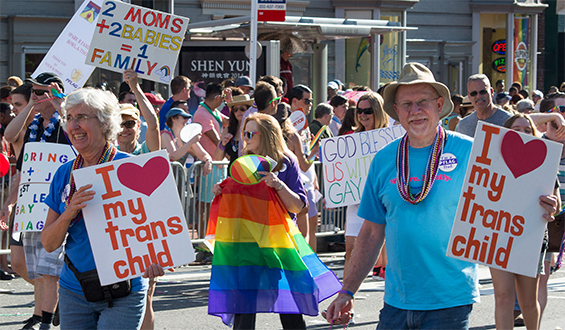
In Federal Way, Washington, Meghan Trainer’s transgender daughter will turn six on Saturday. She says she was putting her to bed one night when she was still Brody, and he asked why God made him a boy because he was a girl.
Trainer told her child that God didn’t make mistakes and that she and her dad were going to “help her be her true self.”
Ms. Trainer used what was quite possibly the best strategy, according to a new University of Washington study published in Pediatrics.
In what was the first attempt to measure mental health among transgender children, UW assistant professor Kristina Olson showed that when family support was present, transgender youngsters had normal levels of anxiety and depression, a level that was close to the levels for typical kids.
JoNel Aleccia, reporting for The Seattle Times, says the results confronted long-time opinions that transgender children are bound to have psychological issues. Olson also runs the TransYouth Project at UW.
Olson’s results are different from findings in previous studies that came to grim conclusions, such as much higher rates of anxiety, depression, and suicide in transgender youth and grown-ups than in the overall population. Even Olson was surprised by the findings.
The research measured 73 transgender children aged 3 to 12 and showed no increase in rates of depression compared to two control groups, including the kids’ siblings and non-transgender young ones in the area. What was a bit higher than the national norm were rates of anxiety, but not raised enough to cause concern.
Children from the US and Canada were recruited and only children who had “socially transitioned,” meaning kids who were living in society as the opposite gender from their birth, were included in the study. Children involved were also required to have been supported in their transition by their families.
This study was the first time research has been done that resulted in data-based guidance for parents of transgender youngsters, who are all-too-frequently unclear on what they should do.
“I think this is a wonderful, wonderful piece of work,” said Dr. Johanna Olson, medical director of the Center for Transyouth Health and Development at Children’s Hospital Los Angeles, who was not involved in the UW study and isn’t related to Kristina Olson.
A majority of the available research on transgender persons who have been rejected by family and community report troubling psycho-social results, writes Lisa Esposito for US News and World Report. HIV infection, self-harm, anxiety, depression, and suicide all occur at an extremely increased rate than in the broader culture, wrote Dr. Ilana Sherer of the University of California–San Francisco Child and Adolescent Gender Center.
One significant reason for the change in research results is the fact that prepubescent children are living in a world that includes a new and growing generation of transgender Americans. These kids are more likely to have families who have allowed them to change the pronouns by which they are identified to the ones they prefer, change their names if they wish, and adopt the clothing and hairstyles of their choice.
It was not long ago that transgender people were classified as having “gender identity disorder” by the Diagnostic and Statistical Manual of Mental Disorders, says UW Today’s Deborah Bach. In 2013, that label was changed to “gender dysphoria” after much lobbying and debate from advocates who were intent on having “disorder” removed from its name.
Dr. Ilana Sherer, a Dublin, California, pediatrician, said letting children live as the gender with which they identify “can be an incredibly affirming process, showing the child that their identity is supported.” Sherer was not involved in the research, adds Lindsey Tanner of the Associated Press.




